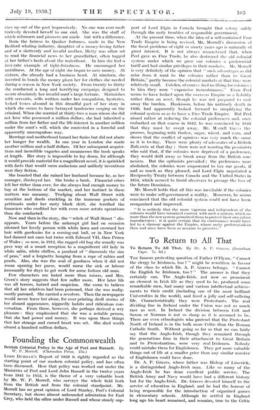Founding the Commonwealth
British Colonial Policy in the Age of Peel and Russell. By W. P. Morrell. (Clarendon Press. 25s.)
Loan DURHAM'S Report of 1839 is rightly regarded as the starting point of our modern colonial policy, and has often been discussed. How that policy was worked out under the Ministries of Peel and Lord John Russell in the twelve years from 1841 to 1852, is the theme of a very valuable book by Mr. W. P. Morrell, who surveys the whole field both from the British and from the colonial standpoint. Mr. Morrell has no great opinion of Lord Stanley, Peel's Colonial Secretary, but shows almost unbounded admiration for Earl Grey, who held the office under Russell and whose steady sup-
port of Lord Elgin in Canada brought that colony safely through the early troubles of responsible government.
At the present time, when the idea of a self-contained Free Trade Empire is being revived. Mr. Morrell's discussion of the fiscal problems of eight or ninety years ago is naturally of great interest. It is not always remembered that, when Peel gave us Free Trade, he also destroyed the old colonial system under which we gave our colonies a preferential tariff and had similar privileges in their markets. Mr. Morrell is very definitely of the opinion that ' such advantages as did arise from it went to the colonies rather than to Great Britain," partly because the colonial markets at that time were relatively small. Cobden, of course, had no liking for colonies ; to him they were " expensive incumbrances." Even Peel seems to have looked upon the overseas Empire as a liability rather than an asset, though he was not prepared to cast away the burden. Huskisson, before his untimely death in 1830, had apparently looked forward to simplifying the colonial system so as to have a Free Trade Empire. But Peel aimed rather at reducing the colonial preferences and, once embarked on that course in 1842, he was convinced by 1840 that they must be swept away. Mr. Ntirrell tract: the process, beginning With timber, sugar, wheat, and corn, and shows that the conflict of opinions was very much the same as it is to-day. There were plenty of advocates of a British Zolltereia at that day ; there were not wanting the pessimists who said that, if the colonies were deprived of a preference, they would drift away or break away from the British con- nexion. But the opt' 'Ls prevailed ; the preferences were abolished, the colonies were empowered to tax our goods, if and as much as they pleased, and Lord Elgin negotiated a Reciprocity Treaty between Canada and the United States in 1854, which seemed to timid observers to presage the lass of the future Dominion.
Mr. Morrell holds that all this was inevitable if the colonies were to make self-government a reality. Moreover, he seems convinced that the old colonial system could not have been • reorganized and improved.
" It is unlikely that the more vigorous and independent of the colonies would have remained content with such a system, which no more than the new system permitted them to protect their own infant manufactures : it is quite certain that its conti llll mice would have led to a clamour against the Empire, whose unity prefercntialists then and since have been so anxious to preserve."
















































 Previous page
Previous page